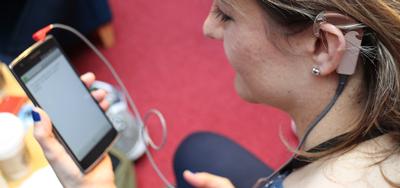Helping people with cochlear implants to monitor them at home

A new initiative pioneered at the University of Southampton’s Auditory Implant Service (AIS) is supporting people with a cochlear implant to fine-tune their hearing at home, rather than at the clinic.
A pilot programme involving 60 patients found most who were given the tools to monitor their hearing themselves were impressed with the new system and appreciated taking control of their own healthcare.
Now, a £500,000 grant from The Health Foundation means audiologists at Southampton can develop these ‘remote care’ tools further and roll out the new techniques across the UK’s 17 other centres to empower many more thousands of patients.
Audiologist and clinical scientist Helen Cullington is delighted her team can now improve the lives of people with cochlear implants still further: “The whole idea is to make the service most person-centred. We want to be here to help when we are needed instead of just once a year at a follow-up appointment. While we always like to meet our patients, it can often be a long journey for them if no adjustments are needed so we find remote care is proving very popular.”
Transforming lives with implants
Over the last 50 years, cochlear implants have transformed life for hundreds of thousands of people with severe hearing loss. The implant replaces the damaged inner ear by sending sound signals to the brain. A microphone behind the ear captures sound, turns it into an electronic signal and conveys it to the implant surgically placed inside the skull, which then sends it to the brain.
Staff at the University of Southampton AIS (formerly known as the South of England Cochlear Implant Centre) implant around a hundred devices a year into adults and children. The patients remain part of the service’s 1,200-strong ‘family’ for life and return once a year for monitoring.
In the UK, around 1,300 people receive a cochlear implant each year, adding to the 14,000 people already using an implant.
Monitoring at home makes a difference
As patients travel to the University of Southampton AIS from across the central south of England and the Channel Islands, many have to make long journeys for their annual check-ups and sometimes find nothing needs to be changed. Others might need support at other times if their needs change and would benefit from visits at different times. Remote care offers them the opportunity to take control of their own hearing healthcare and carry out tests as often as they wish.
The 2016 trial involved 30 patients who were given tools to carry out their own hearing tests at home, analyse the results and address any issues through personalised online support. A control group of 30 continued on their previous care pathway. After the pilot was over, feedback was positive and remote care was judged a success.
“People using the tools felt more empowered, they enjoyed using them and they wanted to carry on with them,” says Helen. “In particular, they valued the chance to carry out hearing tests as often as they wanted, some used the tool every day. Many also used the facility to carry out minor adjustments themselves and, by the end of the trial, some found their hearing had improved, possibly because they felt more in control.”
Patients later commented: “The hearing test has been the best. First thing in the morning, I’d put the hearing aid on and then straight away have the test because I feel when you wake up, you’re at your best … It’s useful to know when to change the microphone covers and when to check the coils … I’ve enjoyed the hearing tests, I also found it helpful getting feedback over the phone … sometimes I’ve done a 160 mile round trip and we’ve moved one electrode one tiny little bit. Now that could have been monitored and done from home.”
Spreading best practice around the UK
The Scaling Up improvement programme grant from The Health Foundation will enable Helen and her team to improve the tools further using professional designers and then support colleagues around the UK to use the technology to allow their patients to monitor their implants themselves. Although remote care should lead to fewer people turning up for routine annual checks, audiologists remain on hand to help and advise patients and face-to-face visits can always be arranged.
The University of Southampton AIS carried out its first implants in 1990 and is at the forefront of research into cochlear implants. Part of the long-established Institute of Sound and Vibration Research, it collaborates with leading clinicians, scientists and engineers and applies the results of their cutting-edge work with patients. Other current projects include initiatives using Bluetooth with computer and web scientists, research into how to make implants more long lasting and resilient and on patients’ experience of listening to music. The service also supervises University student projects at undergraduate and postgraduate level.
Encouraging more people to have a cochlear implant
Helen studied for her Audiology Masters degree at Southampton in 1992-93 and enjoys supporting people with hearing impairments: “I find working with cochlear implants to be a perfect mixture of technology and helping people directly, it’s wonderful to be there when we switch the device on and patients hear their partner’s or children’s voices for the first time. It’s extremely rewarding and I still get quite emotional.”
She urges people with severe to profound hearing problems to find out more about the process as it can genuinely transform their lives. Helen believes AIS is treating only five per cent of people in the region who would benefit from implants. In the UK, the National Health Service funds cochlear implants for people with severe to profound hearing impairments and Helen recommends anyone interested to find out more from their GP.